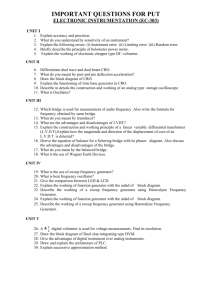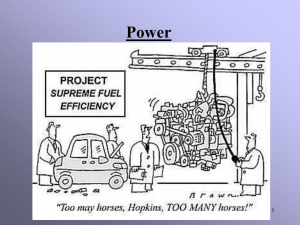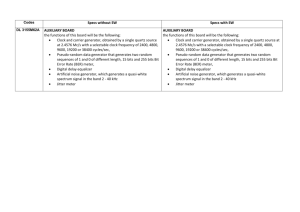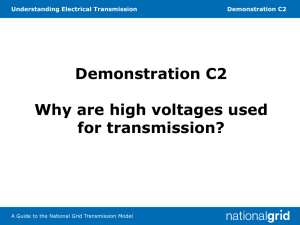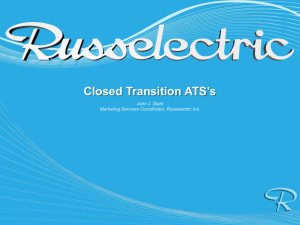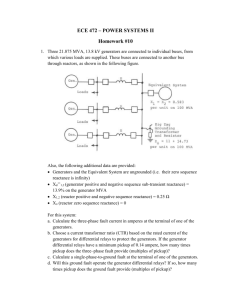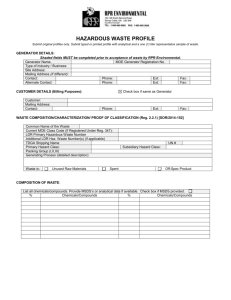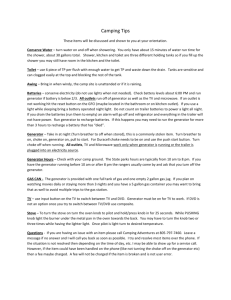Category 4 Parallel Operating
advertisement
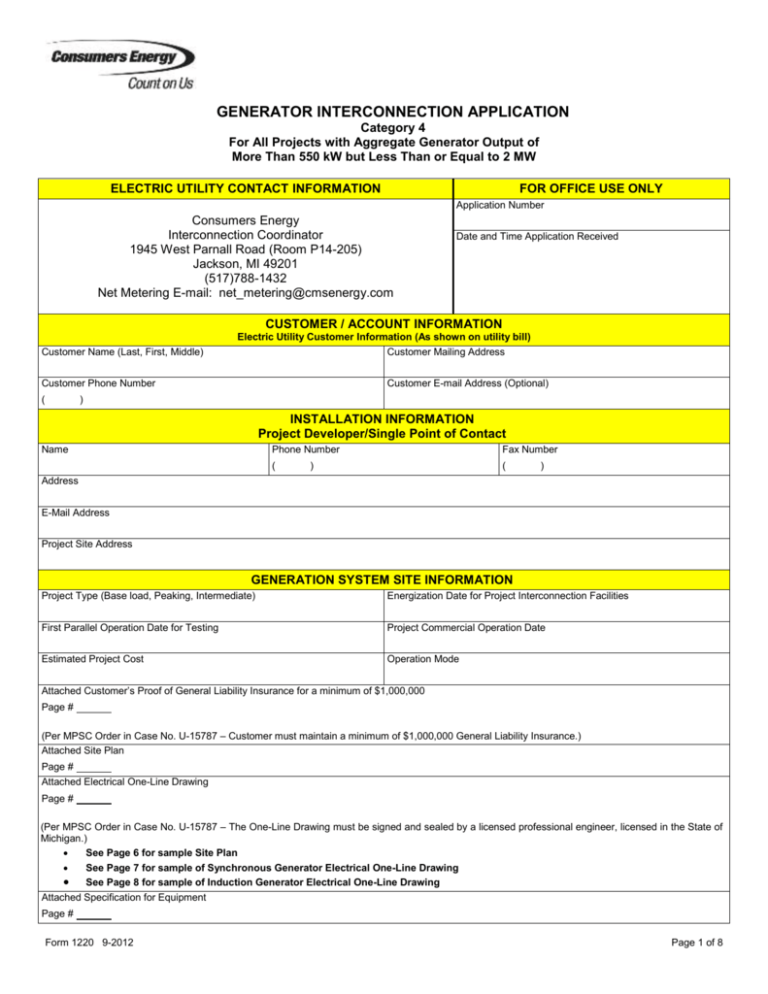
GENERATOR INTERCONNECTION APPLICATION Category 4 For All Projects with Aggregate Generator Output of More Than 550 kW but Less Than or Equal to 2 MW FOR OFFICE USE ONLY ELECTRIC UTILITY CONTACT INFORMATION Application Number Consumers Energy Interconnection Coordinator 1945 West Parnall Road (Room P14-205) Jackson, MI 49201 (517)788-1432 Net Metering E-mail: net_metering@cmsenergy.com Date and Time Application Received CUSTOMER / ACCOUNT INFORMATION Customer Name (Last, First, Middle) Electric Utility Customer Information (As shown on utility bill) Customer Mailing Address Customer Phone Number ( Customer E-mail Address (Optional) ) INSTALLATION INFORMATION Project Developer/Single Point of Contact Name Phone Number Fax Number ( ( ) ) Address E-Mail Address Project Site Address GENERATION SYSTEM SITE INFORMATION Project Type (Base load, Peaking, Intermediate) Energization Date for Project Interconnection Facilities First Parallel Operation Date for Testing Project Commercial Operation Date Estimated Project Cost Operation Mode Attached Customer’s Proof of General Liability Insurance for a minimum of $1,000,000 Page # (Per MPSC Order in Case No. U-15787 – Customer must maintain a minimum of $1,000,000 General Liability Insurance.) Attached Site Plan Page # Attached Electrical One-Line Drawing Page # (Per MPSC Order in Case No. U-15787 – The One-Line Drawing must be signed and sealed by a licensed professional engineer, licensed in the State of Michigan.) See Page 6 for sample Site Plan See Page 7 for sample of Synchronous Generator Electrical One-Line Drawing See Page 8 for sample of Induction Generator Electrical One-Line Drawing Attached Specification for Equipment Page # Form 1220 9-2012 Page 1 of 8 ISOLATING TRANSFORMER(S) BETWEEN GENERATOR(S) AND UTILITY Transformer Model Number Transformer Manufacturer Rated kV and connection (delta, wye, wye-gnd) of each winding kVA of each winding (kW) BIL of each winding Fixed taps available for each winding (kW) Positive/Negative range for any LTC windings %Z impedance on transformer self cooled rating (kW) Percent Excitation current at rated kV Load Loss Watts at full load or X/R ratio (kW) SYNCHRONOUS, INDUCTION AND INVERTER GENERATOR - BASED SYSTEMS (Must complete Page 3, Page 4 or Page 5 and attach Electrical One-Line Drawing The following information on these system components shall appear on the Electrical One-Line Drawing: Breakers – Rating, location and normal operating status (open or closed) Buses – Operating voltage Capacitors – Size of bank in Kvar Circuit Switchers – Rating, location and normal operating status (open or closed) Current Transformers – Overall ratio, connected ratio Fuses – Normal operating status, rating (Amps), type Generators – Capacity rating (kVA), location, type, method of grounding Grounding Resistors – Size (ohms), current (Amps) Isolating Transformers – Capacity rating (kVA), location, impedance, voltage ratings, primary and secondary connections and method of grounding Potential Transformers – Ratio, connection Reactors – Ohms/phase Relays – Types, quantity, IEEE device number, operator lines indicating the device initiated by the relays Switches – Location and normal operating status (open or closed), type, rating Tagging Point – Location, identification Manufacturer Model Name Model Number CUSTOMER AND PROJECT DEVELOPER/CONTRACTOR SIGNATURES AND FEES Attached $250 Interconnection Application Fee Check # Money Order # Sign and Return Completed Application with Application Fee to Electric Utility Contact To the best of my knowledge, all the information provided in this application form is complete and correct. Customer Signature: Date Project Developer/Contractor Signature (if applicable): Date Note: Refer to the applicable “Michigan Electric Utility Generator Interconnection Requirements” for a detailed explanation of the Interconnection Process, Fees, Timelines, and Technical Requirements. Form 1220 9-2012 Page 2 of 8 INVERTER GENERATORS GENERATOR INFORMATION System Type (Solar, Wind, Biomass, Methane Digester, etc) Generation Nameplate Rating (kW or MVA) AC Operation Voltage Manufacturer Model (Name/Number) Attached Grid Configuration Page # Form 1220 9-2012 Page 3 of 8 SYNCHRONOUS GENERATORS GENERATOR INFORMATION Generator Nameplate Voltage Generator Nameplate Watts or Volt-Amperes Generator Nameplate Power Factor (pf) RPM TECHNICAL INFORMATION Minimum and Maximum Acceptable Terminal Voltage Direct Axis Reactance (saturated) Direct Axis Reactance (unsaturated) Quadrature Axis Reactance (unsaturated) Direct Axis Transient Reactance (saturated) Direct Axis Transient Reactance (unsaturated) Quadrature Axis Transient Reactance (unsaturated) Direct Axis Sub-Transient Reactance (saturated) Direct Axis Sub-Transient Reactance (unsaturated) Leakage Reactance Direct Axis Transient Open Circuit Time Constant Quadrature Axis Transient Open Circuit Time Constant Direct Axis Sub-Transient Open Circuit Time Constant Quadrature Axis Sub-Transient Open Circuit Time Constant Open Circuit Saturation Curve Reactive Capability Curve Showing Overexcited and Underexcited Limits (Reactive Information if Non-Synchronous) Excitation System Block Diagram with Values for Gains and Time Constants (Laplace Transforms) Short Circuit Current Contribution From Generator at the Point of Common Coupling Rotating Inertia of Overall Combination Generator, Prime Mover, Couplers and Gear Drives Station Power Load When Generator is Off-Line, Watts, pf Station Power Load During Start-Up, Watts, pf Station Power Load During Operation, Watts, pf Form 1220 9-2012 Page 4 of 8 INDUCTION GENERATORS GENERATOR INFORMATION Generator Nameplate Voltage Generator Nameplate Watts or Volt-Amperes Generator Nameplate Power Factor (pf) RPM TECHNICAL INFORMATION Synchronous Rotational Speed Rotation Speed at Rated Power Slip at Rated Power Minimum and Maximum Acceptable Terminal Voltage Motoring Power (kW) Neutral Grounding Resistor (If Applicable) I2 2t or K (Heating Time Constant) Rotor Resistance Stator Resistance Stator Reactance Rotor Reactance Magnetizing Reactance Short Circuit Reactance Exciting Current Temperature Rise Frame Size Design Letter Reactive Power Required in Vars (No Load) Reactive Power Required in Vars (Full Load) Short Circuit Current Contribution from Generator at the Point of Common Coupling Rotating Inertia, H in Per Unit on kVA Base, of Overall Combination Generator, Prime Mover, Couplers and Gear Drives Station Power Load When Generator is Off-Line, Watts, pf Station Power Load During Start-Up, Watts, pf Station Power Load During Operation, Watts, pf Form 1220 9-2012 Page 5 of 8 SAMPLE SITE PLAN – PROVIDED FOR REFERENCE ONLY SITE PLAN Applicant Address City/Town Signature 30’– 0” 100.00’ Property Line BUILDING SETBACK LINES 20’– 0” 20’ – 0” Sample on-site generator location 150.00’ GARAGE Visible Break Inverter 24’ 24’-0” Home Service Panel Metering To Utility 150.00’ HOUSE 25’– 0” 29’– 0” 36’ N 59º 48’ 00” WEST STREET Weblink to State of Michigan / Plats: http://www.cis.state.mi.us/platmaps/sr_subs.asp Note: Legible hand drawn site plans are acceptable Form 1220 9-2012 Page 6 of 8 SAMPLE ELECTRICAL ONE-LINE DRAWING – PROVIDED FOR REFERENCE ONLY TYPICAL ISOLATION AND FAULT PROTECTION FOR SYNCHRONOUS GENERATOR ONE–LINE DRAWING Licensed PE/Contractor PE/Contractor License Number PE/Contractor Address PE/Contractor Signature LEGEND 27 Undervoltage 32 Reverse Power (Not Required for Flow-Back) 51N Neutral overcurrent (required for grounded secondary) 59 Overvoltage 59N Zero sequence overvoltage (assuming ungrounded secondary on power transformer) 81o/u Over/Underfrequency NOTES A) See technical requirements for permissible connection configurations and protection. Transformer connections proposed shall be shown on the one-line drawing by the Project Developer. Transformer connection and secondary grounding to be approved by Utility. B) Protection alternatives for the various acceptable transformer connections are shown. Only one protection alternative will ultimately be used, depending on the actual transformer winding connections. VT’s for 59, 27, 81o/u and 32 are shown connected on the primary (Project side) of the power transformer, but may instead be connected on the secondary (Utility side). VT’s are required on the secondary of the power transformer if a 59N is required for an ungrounded secondary connection. IEEE std 1547 requirements for voltage and frequency must be met at the PCC. IEEE Std. 1547 permits the VT’s to be connected at the point of generator connection in certain cases. C) Main breaker protection, generator protection and synchronizing equipment are not shown. D) Trip of all 52G breakers or the 52M breaker is acceptable, depending upon whether the Project Developer wants to serve its own isolated load after loss of Utility service. Form 1220 9-2012 Page 7 of 8 SAMPLE ELECTRICAL ONE-LINE DRAWING – PROVIDED FOR REFERENCE ONLY TYPICAL ISOLATION AND FAULT PROTECTION FOR INDUCTION GENERATOR ONE–LINE DRAWING Licensed PE/Contractor PE/Contractor License Number PE/Contractor Address PE/Contractor Signature LEGEND 27 Undervoltage 32 Reverse Power (Not Required for Flow-Back) 51N Neutral overcurrent (required for grounded secondary) 59 Overvoltage 59N Zero sequence overvoltage (assuming ungrounded secondary on power transformer) 81o/u Over/Underfrequency NOTES A) See technical requirements for permissible connection configurations and protection. Transformer connections proposed shall be shown on the one-line drawing by the Project Developer. Transformer connection and secondary grounding to be approved by Utility. B) Protection alternatives for the various acceptable transformer connections are shown. Only one protection alternative will ultimately be used, depending on the actual transformer winding connections. VT’s for 59, 27, 81o/u and 32 are shown connected on the primary (Project side) of the power transformer, but may instead be connected on the secondary (Utility side). VT’s are required on the secondary of the power transformer if a 59N is required for an ungrounded secondary connection. IEEE std 1547 requirements for voltage and frequency must be met at the PCC. IEEE Std. 1547 permits the VT’s to be connected at the point of generator connection in certain cases. C) Main breaker protection, generator protection and synchronizing equipment are not shown. D) Trip of all 52G breakers or the 52M breaker is acceptable, depending upon whether the Project Developer wants to serve its own isolated load after loss of Utility service. Form 1220 9-2012 Page 8 of 8
